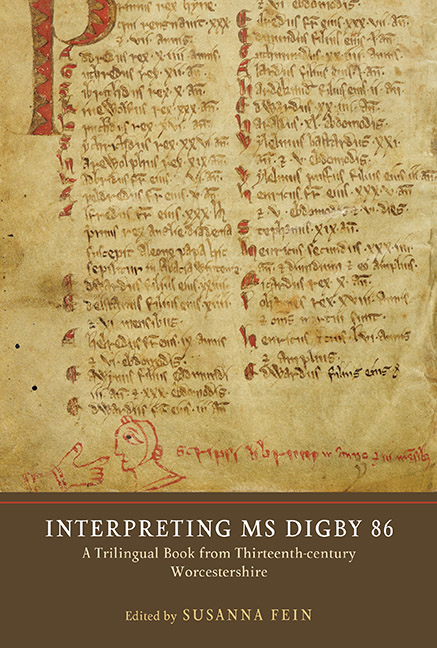Book contents
- Frontmatter
- Contents
- List of Illustrations
- List of Contributors
- Acknowledgements
- Abbreviations
- Digital Facsimiles of Frequently Cited Manuscripts
- The Contents of Oxford, Bodleian Library, Digby 86
- Note on the Presentation of MS Digby 86 Texts
- Introduction
- 1 Fellow Travellers with Saint Nicholas
- 2 Anglo-Norman Religious Instruction in MS Digby 86: Echoes of Lateran IV
- 3 Latin and Vernacular Prayers in MS Digby 86
- 4 Science, Medicine, Prognostication: MS Digby 86 as a Household Almanac
- 5 Literary Therapeutics: Experimental Knowledge in MS Digby 86
- 6 Petrus Alfonsi, the Disciplina clericalis and Le Romaunz Peres Aunfour of MS Digby 86
- 7 Misogyny in MS Digby
- 8 Gender Trouble? Fabliau and Debate in MS Digby 86
- 9 The Middle English Poetry of MS Digby 86
- 10 MS Digby 86 and Thirteenth-Century Scribal Poetics
- 11 The Scarlet Letter: Experimentation, Design and Copying Practice in the Coloured Capitals of MS Digby 86
- 12 Below Malvern: MS Digby 86, the Grimhills and the Underhills in their Regional and Social Context
- Bibliography
- Index of Manuscripts Cited
- General Index
- Manuscript Culture in the British Isles
5 - Literary Therapeutics: Experimental Knowledge in MS Digby 86
Published online by Cambridge University Press: 24 October 2019
- Frontmatter
- Contents
- List of Illustrations
- List of Contributors
- Acknowledgements
- Abbreviations
- Digital Facsimiles of Frequently Cited Manuscripts
- The Contents of Oxford, Bodleian Library, Digby 86
- Note on the Presentation of MS Digby 86 Texts
- Introduction
- 1 Fellow Travellers with Saint Nicholas
- 2 Anglo-Norman Religious Instruction in MS Digby 86: Echoes of Lateran IV
- 3 Latin and Vernacular Prayers in MS Digby 86
- 4 Science, Medicine, Prognostication: MS Digby 86 as a Household Almanac
- 5 Literary Therapeutics: Experimental Knowledge in MS Digby 86
- 6 Petrus Alfonsi, the Disciplina clericalis and Le Romaunz Peres Aunfour of MS Digby 86
- 7 Misogyny in MS Digby
- 8 Gender Trouble? Fabliau and Debate in MS Digby 86
- 9 The Middle English Poetry of MS Digby 86
- 10 MS Digby 86 and Thirteenth-Century Scribal Poetics
- 11 The Scarlet Letter: Experimentation, Design and Copying Practice in the Coloured Capitals of MS Digby 86
- 12 Below Malvern: MS Digby 86, the Grimhills and the Underhills in their Regional and Social Context
- Bibliography
- Index of Manuscripts Cited
- General Index
- Manuscript Culture in the British Isles
Summary
FROM the classical period onward, the Latin term experimentum designated knowledge acquired through ‘experience’, whether by means of direct sense perception or through processes of trial and error. The remit of such experimental learning in late medieval England proved wide, encompassing the domains of artisanal practice and technological artifice, medical treatment and occult science. Within medicine, experimenta designated remedies proven effective through repeated use, while in esoteric literatures the category could apply to clever cautelae (tricks) intended to deceive the senses or unlock the hidden powers of nature. As early as Pliny's Natural History, encyclopedic texts justified the inclusion of marvels and other unusual phenomena on the grounds that eyewitnesses (experti) had verified them ‘through experience’. Often used synonymously with secretum, as ‘secret’ information meant only for an initiated few, experimentum denoted less a discrete category of knowledge than a way of thinking about knowledge, its origins, dissemination and evidentiary status.
Oxford, BodL, MS Digby 86 indicates that experimenta also played a vital role in the history of medieval lay book production. The manuscript contains two sections of ‘experiments’ (arts. 11, 15; fols. 34r, 46r–48r), copied in quires v and vi by the primary scribe of the manuscript, generally accepted to be the compiler and first owner of the book. Written in Latin, with the occasional Middle English gloss or accidental translation (‘and’ for ‘et’, for instance), the experiments number about forty in total, with an unknown number from the first section lost due to a missing quire. The scribe introduces them in the second section as ‘experimencia bona et optima’, a designation that, by accident or design, conflates the two concepts at the heart of this essay: experientia, ‘experience’, and experimenta, ‘experiments’. These ‘tested experiences’ prove an eclectic assortment, ranging from instructions for getting people to leave one's house, to methods for killing flies and cultivating bees, to recipes for making the ‘dead sing’ (‘facere aliqua mortua cantare’) or for helping someone ‘appear that he is Lazarus’ (‘aparere quod sit lazarus’) (fol. 34r). The second section contains recipes pertaining to book production, including instructions for writing in gold, copper or silver, or with invisible ink (fol. 46r), as well as how to light candles with the rays of the sun (fol. 46v), how to make water appear to be wine (fol. 46v) or how to make a rooster sing on a spit while turning itself (fol. 47r).
- Type
- Chapter
- Information
- Interpreting MS Digby 86A Trilingual Book from Thirteenth-Century Worcestershire, pp. 73 - 86Publisher: Boydell & BrewerPrint publication year: 2019



